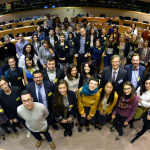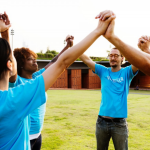Last week, February 11th 2021, L’ORMAinternational took part in the first of information meetings organized by the ITALIAN NATIONAL YOUTH AGENCY
( Agenzia Nazionale Giovani (agenziagiovani.it) ) on the new ERASMUS + and EUROPEAN SOLIDARITY CORPS programs.
The NATIONAL YOUTH AGENCY has released some information on the youth sector of the new ERSAMUS + program, whose official guide, as you may know, has not been published yet by the European Commission.
About the topics and priorities addressed during the new seven-year period, there will be continuity with the last program, with a special focus on the issues of environmental sustainability, inclusiveness and innovation of digital education. These same news were already been provided by the European Commission in the last weeks.
The general structure of the program will also remain similar to the previous one, but with the introduction of some new features and changes. Here are the most important:
– Accreditation for Key Action 1: the biggest new is certainly the inclusion of the accreditation system for projects in Key Action 1. The organizations with more experience in the youth sector and in Erasmus projects, as already known from last September, they will have the opportunity to submit an application for a comprehensive long-term project plan, which can extend up to a maximum of 7 years. Nevertheless, the Agency specified that even accredited organizations will have to submit applications for individual projects from year to year. It will still be possible to participate in the calls even without accreditation, and the Agency announced that space will also be given equally to non-accredited organizations. However, as the budget has not yet been approved, no more information was provided at the moment on how the budget will be divided between accredited and non-accredited organizations. Another interesting aspect that has been specified is that over the years accredited organizations will have the possibility of making additions and changes to their accreditation, adding new activities. The webform to apply for accreditation is already available at this link (2020 Erasmus accreditation in the field of Youth | Erasmus+ (europa.eu)).
– Youth Participation Activities: another interesting new is the inclusion of a new type of ka1 projects, youth participation activities. These projects will have to be managed and carried out entirely by young people under 30, and they can also (but not only) take place at the local level, to strengthen the communities to which young people belong.
– KA2: Some news also affecting the sector of Key 2 action.
As regards projects for the exchange of good practices, small-scale strategic partnerships will also be included, aimed at organizations presenting projects for the first time or in any case with less experience. Instead, the KA2 Innovation (projects for innovation with Intellectual Outputs) will be centrally managed by the EU.
– KA3: about key action 3, there will no longer be youth dialogue projects, while this action will focus more on political dialogue actions with young people. That means that this area it will not be possible for NGOs to apply for calls directly.
– #DISCOVER EU: finally, from the year 2021 this new action will be included, aimed at 18-year-olds. Young people will have the opportunity to spend a short and informal travel experience within the EU, with the aim of increasing their sense of European citizenship. The role of NGOs and associations in this program may be to provide support by offering non-formal education activities to participants in the countries they travel to. Unfortunately, it is not yet known whether it will be possible to start this type of mobility in 2021 due to the pandemic, which still severely limits travel.
But when will we be able to apply our projects? As we know in recent weeks, the European Commission announced the release of the new program in the second half of March. The National Agency has announced that in 2021 there will be 2 deadlines, probably one in late spring (May, June) and one in autumn. Of course, everything will depend on the release date of the guide.
Do you want to know more about the next developments of the new ERASMUS + program? Click here !


